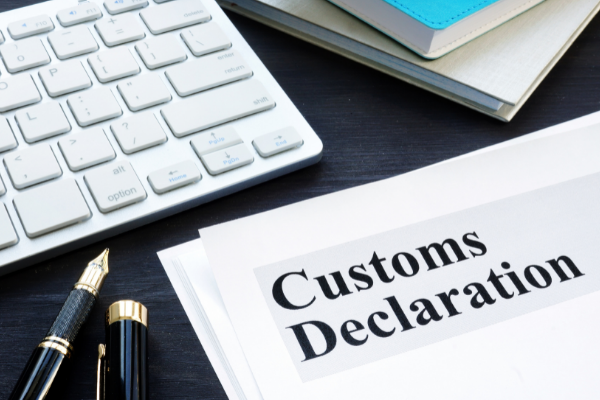BY:
SHARE:

Getting into import and export can feel like plunging into a foreign country—full of unexplained shorthand and puzzling abbreviations. No one wants to look lost in conversation or feel overwhelmed when filling out a Customs form. That’s precisely why mastering Customs jargon is a smart starting point—so you can work, communicate, and trade with confidence.
1. HS Code (Harmonised System Code) – A universal numbering system for classifying traded goods. It determines duties, restrictions, and eligibility for trade deals.
2. Incoterms ® Rules – Standard shipping terms (like FCA, DAP) or International Commercial Terms that define shipping responsibilities, insurance, and costs.
3. CDS (Customs Declaration Service) – The UK’s updated system for Customs declarations, replacing the old CHIEF platform.
4. Tariff – The duty or tax imposed on imported goods, determined by the HS Code.
5. Commodity Classification – The process of assigning the correct HS code to your product is critical for accurate duties and compliance.
6. Origin vs. Preference – 'Origin' is where a good is made; 'Preferential Origin' allows reduced duty if specific trade deal criteria are met.
7. Customs Procedure – Four-digit codes that define how Customs processes apply to your shipment (e.g., temporary import, inward processing). Formerly known as CPC (Customs Procedure Code). Completed by a 3-digit Additional Procedure Code to make it more specific to a particular Customs scenario.
8. Transit – Moving goods through a country to another destination, often using a guarantee system like NCTS, for example, goods moving from the UK, across the EU to Switzerland.
9. Temporary Admission (TA) – Allows goods into the UK temporarily (e.g., for exhibition) with reduced or no duty.
10. Inward Processing Relief (IP) – A common Customs procedure that allows goods to be imported for processing or repair and then re-exported without paying duty or VAT. Correct use of IP can save businesses significant costs, but it requires strict record-keeping and compliance with HMRC’s conditions.
11. Import VAT – VAT on goods entering the UK; can be postponed via Postponed VAT Accounting (PVA).
12. Export Licensing – The system ensures controlled goods (e.g., dual-use or sensitive items) have official export authorisation.
13. Audit Trail – All documents and records kept to prove you're trading compliantly—essential if HMRC requests them.
14. Bonds & Guarantees – Collateral systems used with special procedures like transit or warehousing.
15. Customs Guarantee Waiver – HM Revenue & Customs (HMRC) allows certain traders to apply for a guarantee waiver when using special procedures. If approved, this reduces the need to provide a financial guarantee for potential Customs debts, thereby improving cash flow while still ensuring HMRC's assurance of compliance.
I know, that’s only 15 terms!!! Customs jargon can feel like another language — and honestly, sometimes it is. But once you crack the code, you start spotting things that save you money (like duty reliefs), keep you out of trouble (like using the correct procedure codes), and help you talk the talk with freight forwarders and HMRC without breaking a sweat. Think of it this way: these terms are your starter pack for trading. Get them wrong, and you’re fumbling around at the border, trying to explain yourself. Get them right, and you glide through with confidence (and maybe even impress your colleagues by knowing what “Inward Processing” actually means).
And if you’d rather not spend weeks untangling jargon on your own, there are beginner-friendly courses that show you how all this works in practice — with real examples, not just dictionary definitions. Strong & Herd’s guides are a bit like having Google Translate for Customs, only they come with people who know what they’re talking about.
So, yes, Customs jargon can look intimidating at first glance. But once you’ve got the basics under your belt, it’s less like learning Latin and more like picking up the lingo for your next holiday — useful, empowering, and guaranteed to save you from some awkward situations at the border.
OneCall™ Email assistance as and when required; A one-call solution for all your import, export and customs enquiries. Export help. Import help. Customs help.
Stay informed about customs and international trade matters by subscribing to our OneCall™ service. This comprehensive offering includes a dedicated email helpline for support, timely practical updates direct to your inbox (Did You Know?), monthly UK Customs & Trade Briefings and access to an interactive members' area with an exclusive community for our subscribers.
International Trade Updates & Spotlight Newsletter
Subscribe to our free information emails covering international trade topics...
MORE INDUSTRY INSIGHTS...











